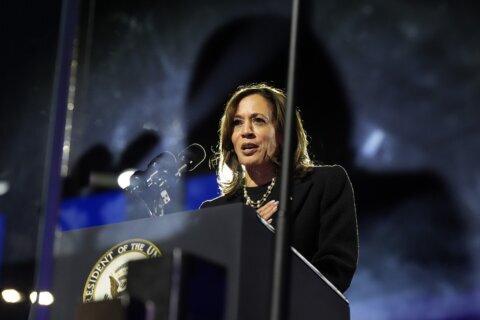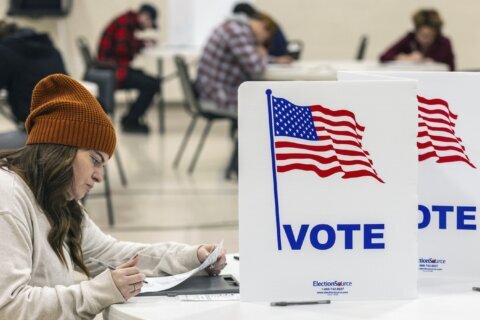It was a milestone night Thursday for Kamala Harris’ presidential campaign, as the sitting vice president accepted the Democratic Party’s nomination for president during the final night of the Democratic National Convention in Chicago.
It’s been a whirlwind four weeks for Harris, who was thrust into the spotlight once President Joe Biden decided to drop his reelection campaign. And she’s endured personal attacks from her opponent, former President Donald Trump, that surround her gender and race.
Kelly Dittmar, director of research for the Center for American Women and Politics at Rutgers University, joined WTOP’s Shawn Anderson and Anne Kramer to talk more about those attacks.
The transcript below has been lightly edited for clarity.
Shawn Anderson: Give us an idea, how surprising is the level of personal attacks on Kamala Harris coming from Donald Trump and even his allies and supporters?
Kelly Dittmar: Unfortunately, it’s not surprising, and I would say that on two levels. First, we know that U.S. politics itself, and especially at the presidential level, is one that still is imbued with a lot of biases, both gendered and racialized biases about who should run, who should lead, and also expectations based on what we’ve seen historically, which of course, does not include a woman, and specifically not a woman of color.
So those biases exist and often allude to or allow that type of scrutiny and bias in terms of evaluations. But the second part of it is that Donald Trump himself has really relied on a strategy of playing into gendered and racialized stereotypes to try to use it to his own advantage. And so he’s tried to use gender and race and sexism and racism in the electorate in a way to increase his support among his base of voters. And so for him, specifically, to weigh these arguments and attacks is unfortunately not new at all, and something that I think you see the Harris campaign and Harris’ supporters already anticipated and are able to respond to, I think, more quickly and flexibly.
Anne Kramer: Kelly, that’s what I wanted to ask you about, is response, because many times throughout our lives, we will hear just ignore these type of attacks, name calling, etc., “don’t stoop to the level of the person making the attacks.” But is that always the best way for women in elected office to handle these type of things?
Kelly Dittmar: I think you’re right. That has historically been a strategy and even something recommended to women, because you don’t want folks to accuse you of playing the “race card” or the “gender card,” but what we’re seeing with Kamala and other candidates who’ve done this effectively is often they can get third-party validators and surrogates, organizations that back you, or even in this case, something like Kamala HQ to come out in response to these attacks, without it having to come from the mouth of, if you will, the candidate. And so I think we’re seeing her campaign, and those who back her really push back quite quickly on these attacks and even kind of make fun of them in a way that diminishes the seriousness with which they’re taken.
Shawn Anderson: On a general level, why are women attacked on a personal level more than men?
Kelly Dittmar: Well, I think it’s based on what we’ve allowed as a society in terms of expectations. And so when we’ve perpetuated stereotypes that women are less competent or that women’s value is related to their attractiveness, those kinds of norms and expectations then lead to a type of attack on a personal level, because that’s where the weakness lies. That’s where there’s an incongruity between this elected office and the traits and experiences expected of that office, and the traits and expertise associated with your gender. And I think that’s a piece of why we see more of those attacks against women than we have men who’ve been assumed to have these areas of expertise and strength.
Anne Kramer: Kelly, what impact, if any, do these type of attacks have on women who want to get into public service, as a deterrent to them?
Kelly Dittmar: Certainly, we’re always concerned, and we don’t have really great evidence that it does strongly deter women to run, especially because we have seen women like Kamala Harris really push back and overcome these types of challenges. But there is no doubt that watching this type of toxicity would make a woman second guess whether or not it’s worth it. And so we know women are often doing a cost-benefit analysis: “How much can I get done in a position of elected leadership versus how much incoming I have to take in order to get that done?”
And so we want to shift that equation so that they see fewer costs and more benefits. And in this scenario, somebody like Donald Trump and other folks who are coming out and making these personalized attacks and really unfair attacks is certainly not helping us in recruiting women. But we’re also seeing high energy among women who say, “I won’t stand for this, and actually, we need more of us in office to change these norms and make sure this is unacceptable.”
Get breaking news and daily headlines delivered to your email inbox by signing up here.
© 2024 WTOP. All Rights Reserved. This website is not intended for users located within the European Economic Area.







